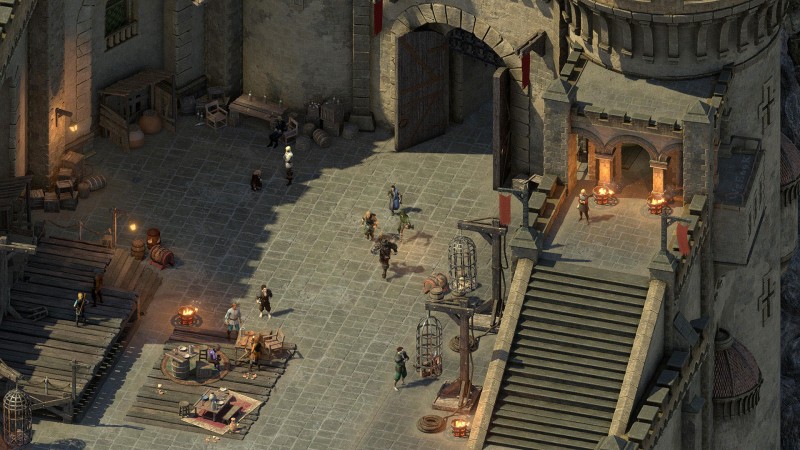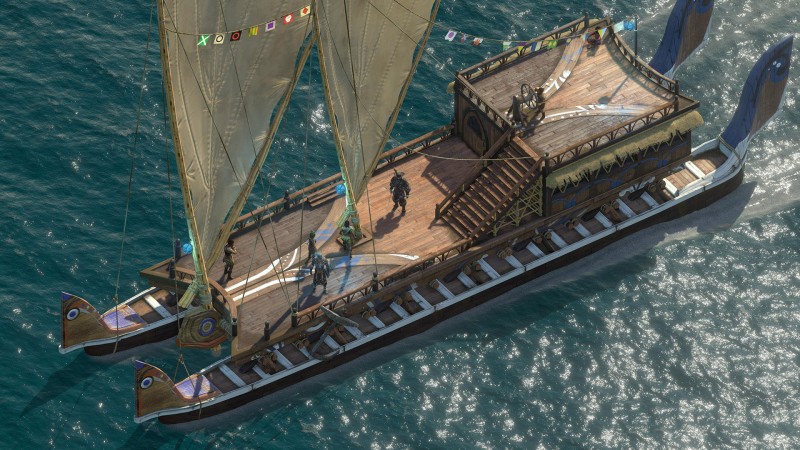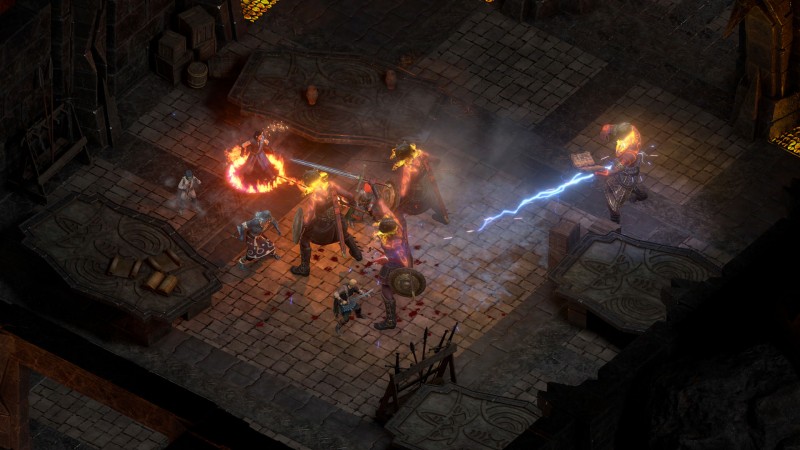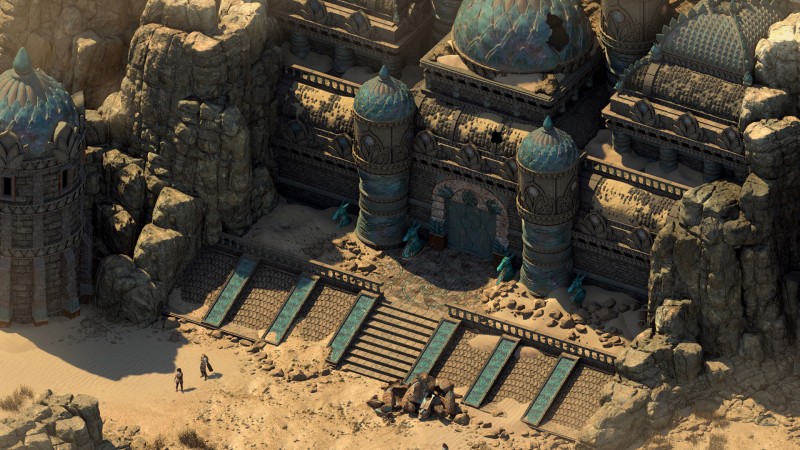Pillars Of Eternity II Director On Fan Feedback, Publishers, And Genre Evolution

Josh Sawyer has had a long and prolific career with role-playing games. Having started in 1999 at Black Isle studios, Sawyer has been a major design force behind games like the Icewind Dale series, Alpha Protocol, and Fallout: New Vegas. Between Black Isle and Obsidian, he's cultivated a reputation for strong narratives. As Obsidian stood on the brink of closing down after a publisher cancellation, Sawyer suggested they return to their roots of isometric RPGs and turned to crowdfunding to fund Pillars of Eternity, which he was then selected to direct.
Now, with Pillars of Eternity II: Deadfire on the horizon, Sawyer is vocal about what where the community has taken the game and how the genre is evolving.
Game Informer: Walk me through the genesis of creating a scenario for a game. Do you work with gameplay first or start with a story idea?
Sawyer: Well, with Pillars II, we knew we weren't going to make something completely new in terms of gameplay. A lot of the genesis of it, whether it's story or mechanics, we look to our community first for feedback to see what they thought about the first game and look for ways we can apply that to the second game. We also asked ourselves internally, what are some things we've always wanted to do in a game like this that have never been done before?
For example, all of our ship mechanics are things that grew out of our own personal feeling of 'Hey, if we're setting this game in an archipelago, and we want to have more exploration, why not have a ship?' Then eventually we thought, well, we had a stronghold in Pillars 1 that we didn't integrate very well into the game, and it was criticized by the community for not integrating well into the game, so let's make a lot of the mechanics we would have put into the stronghold into the ship instead. We made that the focus because that's the thing you use to explore the world with.
With something like the story, we looked at a lot of the feedback from the first game where people felt that the hook was kind of ambiguous and they weren't really sure 'Why am I following this guy? Who is this guy? No one knows that he even exists.' So he was kind of an absent protagonist for a lot of the game. People also criticized the way that we used factions, because the factions felt like they were only in the middle of the game and then they were kind of forgotten by the end of it. We thought about having a much stronger player hook from the beginning, so [Eoran deity] Eothas occupying a statue and destroying your castle and marching across the sea seemed like a pretty clear and obvious threat.
When we thought on how to integrate the factions into the game, we worked much more to make sure that the factions felt integral to the progression of the story and that they moved through the entire arc of the story into the end of the game.

Do you think it's harder to write a story where you're giving the payer so much autonomy? They design their characters and choose how to ascend through the narrative as they see fit.
Yeah, that is a greater challenge, but that's kind of what we do. That's what Obsidian really focuses on, choice and consequence. We do try to design everything to really be as flexible as possible, which causes some headaches, but that's the challenge, that's why we're designers. For example, technically there are two big parts of the critical path that a player can completely circumnavigate if they want to. The story has to be able to work with them doing that.
I think the instinct of a lot of developers might be, well just don't let them do that. We're like, 'No, figure out a way to make that work,' which is the bigger challenge, but it ultimately makes players feel like they have more freedom. A lot of the inspiration for Pillars is taken off tabletop where you have as much freedom as the [Dungeon Master] gives you, but we're not there to be the DM for the player. We have to build a narrative and a set of rules that still allow them to have as much freedom as they want.
You've mentioned taking direction from the community. What are the differences between developing a crowdfunded title and a publisher-backed title that has the community in mind?
Not being second-guessed by the publisher.
That's the main thing?
That's the biggest thing, yeah. We always try to listen to the community, even going back to Black Isle Studios, which is where I got my start. We don't do everything the community says, because some of their ideas are not very good, but we do try to listen to them and hear them out to figure out what their underlying problems are. But with a publisher, well, everything is much, much more tightly controlled in terms of how we communicate and message that sort of stuff. So fans usually don't wind up knowing much about the project until much later, they don't wind up knowing details about the project until much later than that, and by that point, it's much more difficult to course correct.
When we're working with crowdfunding, we have to show and give people information much earlier because they're the ones that are ultimately putting money into it. We have to show, like, this is what we're thinking of doing to get the buy-in from them very early on. Things like our backer beta are actually much more useful to us than focus testing, because the backers... it's not their job to give coherent feedback, though the feedback that they give us can be very useful to us. Rather than having a publisher second-guessing what you're doing, and second-guessing what the community is saying, you can just work directly with the community, take their feedback, and then, of course, we use our own experience as developers to try and make the right decisions.
I think it's a much more open and direct process than when you have a publisher in the mix trying to shape the direction of the game and shape the messaging of the game in a way that makes it very hard to interface with the fans in a direct way.

Have there been situations where the community felt very strongly about something but the team disagreed?
Yeah. Obviously when we started our backer beta this time, I made a change to how the armor system worked to try and make it much clearer when you need to be switching attack types and damage types, and it was so clear and so punitive that people really, really hated it. We rolled back on that, but I never thought people were going to be that opposed to it. They really didn't like it, so we made it more of a step-progression.
Then there was when we took the party size down from six to five, which is still very contentious among a lot of people. But the fact is that six is just a number that we inherited from the Infinity Engine games, and in the Infinity Engine games, half your party members typically don't have a lot of active abilities - fighters, thieves, characters like that - they don't really have a whole lot that they need to do to micromanage them. With Pillars, while you don't technically need to micromanage your characters, it's much more demanding overall. By taking the party size down from six to five, it allowed us to make each character in the fight easier to manage all their abilities and it makes the fights overall much better in Pillars II than Pillars I.
It's easy to look at the numbers and say, 'No, no, no, going from six to five is just stupid,' but we didn't just do it on a whim, we did it to make the experience more tactically engaging and make the fights more analytical.
Speaking of the Infinity Engine, games like Pillars are designed to be the evolution of that type of game. What's the next step to evolve the genre?
It's interesting, I think that you will see that there will be more of... ours, I'd say, is among the more traditional of these evolutions. If you look at something like Divinity: Original Sin II, I think that their gameplay inherently feels a little bit more contemporary, because I think it's more about experimentation. I think we'll probably see more games - I don't want to say like Divinity, but games that are experimenting more with the gameplay styles.
With Pillars, we really cleave to the very traditional experience, which I think is good, that's what our fans want, but I think that this type of game can be a lot of different types of game. It doesn't have to be just as traditional as we've made it. We'll see more turn-based games, we'll see more real-time with pause, and I always want to see more experimentation with choice and consequence. That's something we're trying to emphasize with our companion relationships and our topic system, and these are new tools that we use as writers to make the game feel like it's reacting to the choices you make.
So, whether it's purely mechanical gameplay or narrative stuff, I want to see developers pushing the boundaries more. I believe that whether you're making a 2D game or a 3D game, the [isometric] party-based game can be a really fun genre to do a lot more with.

Do you ever worry about the difference between evolution and changing something beyond recognition?
I worry about it a little bit. I think our fans worry about it more than I do. You know, Divinity is very different from the Infinity Engine games, it's an awesome game, and people love it. Tons of people love it. I think that it's okay to experiment with this stuff, but I do think that it's always important for developers to keep in mind what their fans are looking for. But also, we as developers need to take some risks and sometimes those risks won't work out. If we just make the same game over and over again, though, sooner or later the fans are going to get tired of that.
For us, it was ships, and that was our big new thing that we added, which might seem like a little thing, but those are crazy deep systems. It took us a lot of time to implement them and some players won't like them, maybe it's a bad experiment, but it's something we wanted to try, so I hope we do more experimentation like this. It's not impossible that it will become unrecognizable, but I don't think any of us working in this space are anywhere near the limits of what we can do with it.
Pillars of Eternity II: Deadfire releases May 8 on PC and on Switch, PlayStation 4, and Xbox One later this year.

Get the Game Informer Print Edition!
Explore your favorite games in premium print format, delivered to your door.
- 10 issues per year
- Only $4.80 per issue
- Full digital magazine archive access
- Since 1991









